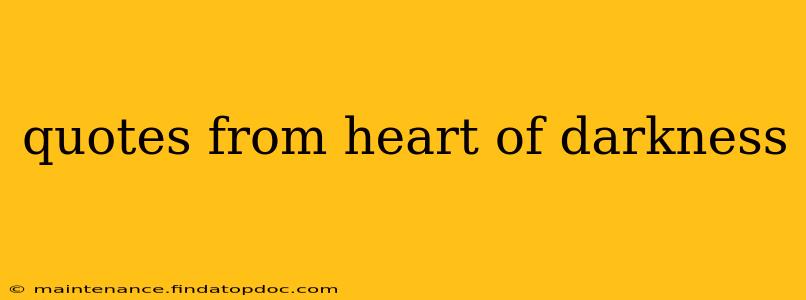Joseph Conrad's Heart of Darkness is a masterpiece of psychological and political fiction, leaving a lasting impact on readers with its haunting prose and unsettling exploration of colonialism and human nature. The novel's power lies not only in its narrative but also in its unforgettable quotes, which continue to resonate with readers and inspire critical analysis even today. This exploration delves into some of the most significant quotes from the novel, analyzing their context and enduring relevance.
The Most Famous Quote: "The horror! The horror!"
Perhaps the most well-known quote from Heart of Darkness, "The horror! The horror!" uttered by Kurtz in his dying breath, encapsulates the novel's central theme: the horrifying consequences of unchecked ambition, imperialism, and the darkness inherent within humanity. It’s not simply a reaction to a specific event, but rather a culmination of Kurtz's experiences in the Congo, his descent into savagery, and the realization of the moral bankruptcy at the heart of colonialism. The ambiguity of the quote—what exactly is the horror?—leaves room for individual interpretation, making it endlessly fascinating. Is it the horror of his own actions, the horror of the colonial enterprise, or the horror of the innate darkness within the human soul? The power of the quote lies in its multifaceted interpretation and lingering impact.
"The conquest of the earth, which mostly means the taking it away from those who have a different complexion or slightly flatter noses than ourselves, is not a pretty thing when you look into it too much."
This quote highlights the brutal reality of colonialism, directly addressing the ethical implications of European expansion. The narrator's detached yet critical tone underscores the hypocrisy and casual brutality involved in the process of colonization. The seemingly innocuous phrase "slightly flatter noses" underscores the superficiality of the justifications used to justify the violent dispossession of indigenous peoples. It serves as a stark reminder of the racist ideologies that underpinned colonialism and the devastating impact it had on colonized populations.
"It's queer how out of touch with truth women are."
This quote, reflecting the patriarchal worldview of the time, reveals the narrator's limited understanding of women and their perspectives. The statement is problematic, perpetuating a sexist notion that diminishes the intelligence and perceptive abilities of women. It showcases the constrained societal roles and perceptions of women prevalent during the late 19th century and serves as a focal point for discussions about gender roles and biases within the text. It stands in stark contrast to other portrayals of women in the novel, especially the ambiguous role of Kurtz’s Intended.
What is the meaning of "the horror" in Heart of Darkness?
As previously discussed, the meaning of "the horror" is open to interpretation. It's a powerful statement that encapsulates the cumulative effect of the novel's exploration of imperialism, human cruelty, and the dark side of human nature. It represents the profound moral degradation Kurtz experiences in the Congo, the appalling conditions faced by the native population, and the shocking realization that the darkness lies not just in the "savage" other but also within the heart of the colonizer.
What are the main themes in Heart of Darkness?
Heart of Darkness explores several complex and interwoven themes, including:
- Imperialism and Colonialism: The brutal realities of colonial exploitation and the devastating impact it has on indigenous populations.
- Human Nature: The inherent darkness and capacity for cruelty within humanity, regardless of race or background.
- Civilization vs. Savagery: The blurred lines between these concepts and the implication that "civilized" societies are not necessarily morally superior.
- Identity and Self-Discovery: The narrator's journey of self-discovery and his confrontation with the darkness within himself.
- Madness and Obsession: Kurtz's descent into madness and the dangers of unchecked ambition.
What is the significance of the ending of Heart of Darkness?
The ending, with Kurtz's dying words and the narrator's interaction with Kurtz's Intended, underscores the novel's ambiguity and the unresolved questions surrounding the nature of darkness and its impact on individuals and society. The carefully crafted deception perpetuated by the narrator on Kurtz’s Intended leaves the reader questioning the ethical implications of the entire colonial venture. The ambiguous nature of the ending compels readers to confront the unsettling truths presented throughout the narrative.
What is the importance of Marlow in Heart of Darkness?
Marlow serves as the narrator and protagonist of Heart of Darkness, guiding the reader through the story and providing a crucial perspective on the events unfolding. His journey into the Congo represents a journey into the heart of darkness, both externally in the oppressive colonial environment and internally in the exploration of his own morality and biases. His character provides a lens through which we can examine the themes of the novel, ultimately allowing for multiple interpretations of its message.
By carefully analyzing these quotes and themes, readers can gain a deeper understanding of the enduring power and lasting relevance of Joseph Conrad's Heart of Darkness. The novel's haunting imagery and philosophical depth continue to provoke discussion and debate, cementing its status as a literary masterpiece.
